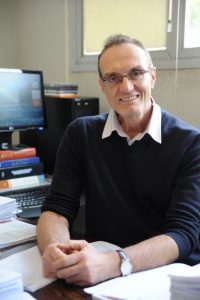Sorry, this entry is only available in Brazilian Portuguese.
Tag: DEMa UFSCar
Prof. Victor Pandolfelli reelected for the advisory board of the World Academy of Ceramics.

B-MRS member Victor Carlos Pandolfelli, professor in the Department of Materials Engineering at the Federal University of São Carlos (DEMa-UFSCar), was reelected as a member of the advisory board of the World Academy of Ceramics (WAC) to fulfill his second 4-year term (2018 to 2022). The board will include the Brazilian researcher, along with Professor Gary Messing (Penn State) and Dr. M. Singh (NASA), as representatives of the Americas.
In order to be part of the WAC advisory board, it is necessary to be a member of the Academy and be elected by vote of the members of the same region of the planet (in this case, the American continent). The names of the most voted must be endorsed by the presidency of the Academy. To be a member of the WAC, one must undergo a selection process that includes nomination by two effective members, evaluation of the application by a peer committee selected by the Academy, and final approval by at least ten of the twelve members of the advisory board.
According to Professor Pandolfelli, some of the activities he will hold in the council over the next four years are: reviewing the WAC admission rules, defining the members who will participate in the new candidate selection processes, defining the topic and speakers for technical presentations and awards in the scientific forum for members of the Academy.
The inauguration and first meeting of the new council will be held next June in Perugia (Italy).
Professor Victor Pandolfelli (DEMa – UFSCar) elected as honorary member of the European Ceramics Society.

Professor Victor Carlos Pandolfelli, of the Materials Engineering Department of the Federal University of São Carlos (DEMa-UFSCar) was elected Honorary Fellow of the European Ceramic Society (ECerS).
The statute of that society determines that only scientists from the European Community can be elected as members. The title of Honorary Fellow was created in 2017 for researchers from other regions to be recognized for their scientific contribution in the area of ceramic materials. In this first selective process that occurred through internal voting by the Council of ECerS, without the candidates’ knowledge, Professor Victor Carlos Pandolfelli of the Department of Materials Engineering at UFSCar was the first Latin American chosen for this honor. Also on the list of honorary members are Professor Gary Messing (Penn State, EUA), Dr. M. Singh (NASA, USA) and Professor M. Yoshimura (Tokyo Institute of Technology, Japan, and University of Taiwan).
Seleção para mestrado e doutorado no PPGCEM-DEMa-UFSCar.
Está disponível na página da PPGCEM – DEMa -UFSCar o Edital para seleção de mestrado/doutorado (aluno regular e especial) para 2017.
Oportunidade para as seguintes áreas (mestrado/doutorado):
– Tratamento superficial em vidros óxidos por meio de lasers de alta potência
– Crescimento de Cristais por fusão a laser
– Dispositivos sensores
Professor Victor Carlos Pandolfelli (DEMa-UFSCar) was chosen to serve as one of the editors-in-chief of the journal Ceramics International (Elsevier).

Professor Victor Carlos Pandolfelli, of the Department of Materials Engineering, Federal University of São Carlos (DEMa-UFSCar) was chosen to serve as one of the editors-in-chief of the journal Ceramics International. The international journal with 41 years of history is published by Elsevier. It currently has an acceptance rate of 25% of the articles submitted.
Pandolfelli completed his doctorate in Leeds (UK) in 1989 and in 1996 and 1997 he completed his postdoctoral studies at the École Polytechnique in Montreal (Canada). He is full professor at DEMa-UFSCar, member of the Brazilian Academy of Sciences, full member of the World Academy of Ceramics, a fellow of the American Ceramic Society, full member of the Brazilian National Academy of Engineering and guest professor at Wuhan University of Science and Technology (China). He is a member of the board of the World Academy of Ceramics (2014-2018), member of the International Technical Board of Morgan International (England) and Latin American coordinator of the FIRE (Federation for International Refractories Research and Education), which involves 10 universities in different countries and 17 leading companies in the refractory area. He is the author of 480 articles published in scientific journals and two books. He has received 12 international awards.
Gente da nossa comunidade: pesquisadores do DEMa-UFSCar ganham dois prêmios da Petrobrás na área de materiais refratários.
Os pesquisadores da Universidade Federal de São Carlos (UFSCar), Dra. Mariana de Albuquerque Lima Braulio e Dr. Eduardo Prestes, ambos orientados pelo Prof. Dr. Victor Carlos Pandolfelli, do Departamento de Engenharia de Materiais (DEMa -UFSCar), foram contemplados com premiações concedidas pela empresa Petrobras.
O primeiro deles foi o “Prêmio Inventor 2013”, em decorrência do depósito de patente realizado no INPI (BR 10 2012 030520-8), intitulada “Sistema refratário nanoestruturado de elevada resistência a erosão e ao choque térmico”, de autoria de Eduardo Prestes, Mariana A. L. Braulio, Victor C. Pandolfelli (UFSCar) e Jorivaldo Medeiros, Daniel Telhado, Jordana Veiga (Petrobras). A solenidade de entrega ocorreu no Cenpes da Petrobras.
Já a segunda premiação se trata do “Prêmio Petrobras de Tecnologia 2013”, concedido à Mariana A. L. Braulio e Victor C. Pandolfelli, pelo trabalho “Macromercado para nanomateriais: aumentando o desempenho operacional das unidades de craqueamento catalítico (UFCC)”. O trabalho foi selecionado como o melhor na categoria doutorado no tema de tecnologia de refino e petroquímica.
Ambos os trabalhos envolveram o desenvolvimento de cerâmicas refratárias nanoestruturadas, cuja finalidade principal é o aumento de disponibilidade operacional das UFCCs. Como o lucro cessante associado a uma parada de produção pode alcançar valores próximos a US$ 500.000/dia por UFCC, esforços para se maximizar o tempo de campanha e minimizar as paradas destas unidades são essenciais. Uma vez que um dos aspectos que limitam as campanhas é a baixa vida útil dos refratários, materiais nanoestruturados de elevado desempenho foram desenvolvidos e estão em teste em escala piloto desde 2011 na Revap (Refinaria Henrique Lage da Petrobras), visando a extensão da vida útil dos equipamentos e maior segurança operacional.
